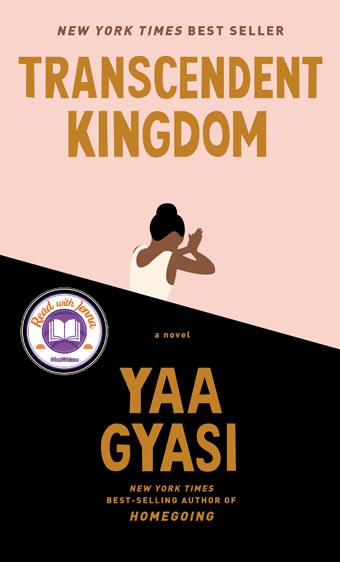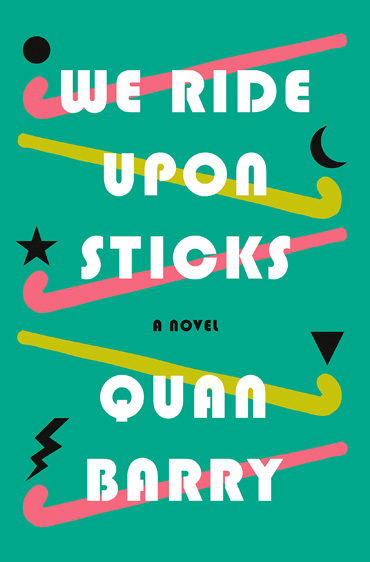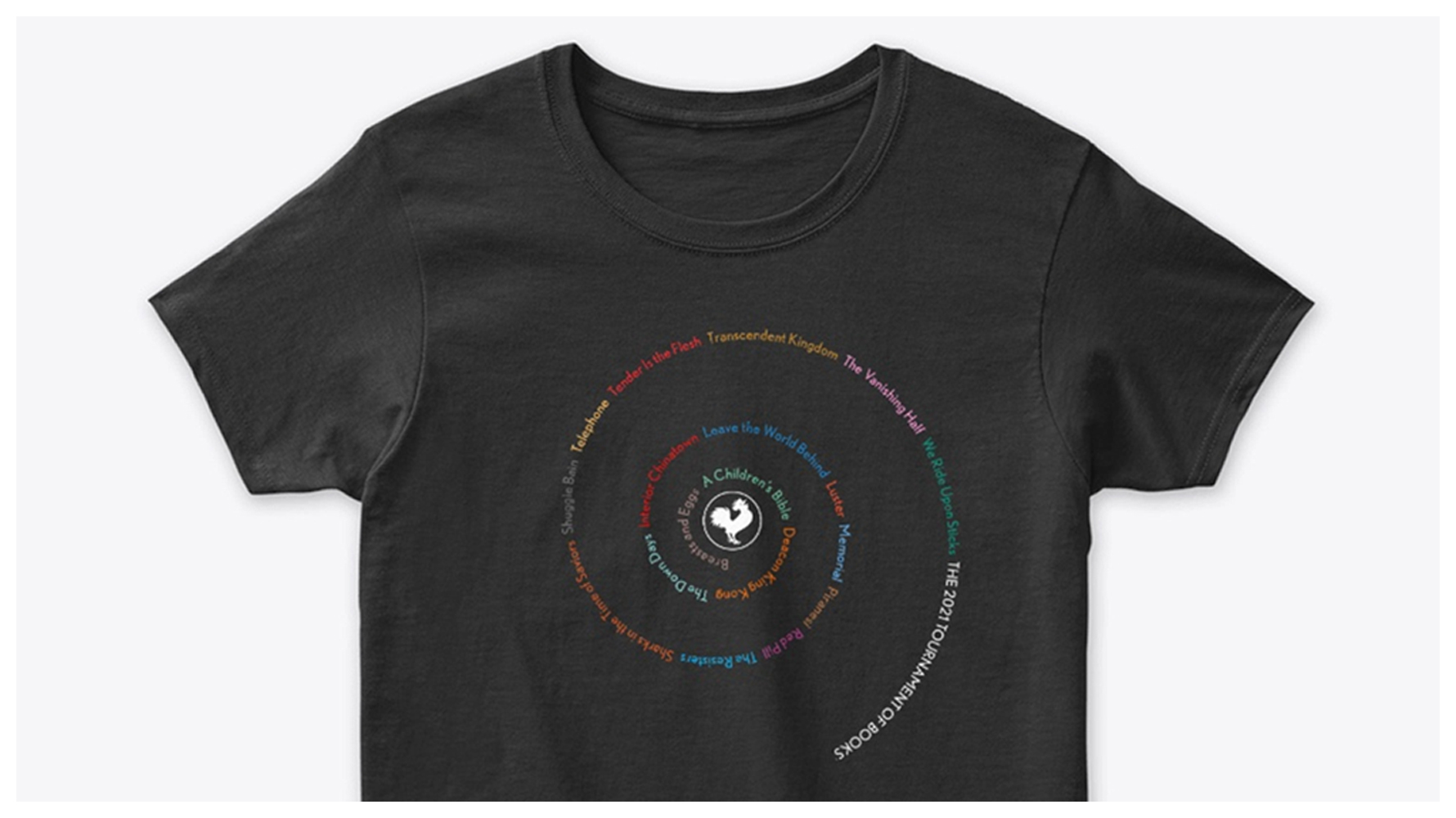-
March 11, 2021
Opening Round
-
Yaa Gyasi
1Transcendent Kingdom
v.
4We Ride Upon SticksQuan Barry
-
Judged by
Felicia Davin
One of fiction’s many allures is that someone’s in charge. Real life, chaotic and narratively unsatisfying, offers no such comfort. But a story has an author. A novel is a microcosm with the name of its particular god printed right on the cover.
Both of these books deal with faith, doubt, and belief in a higher power. True, in Transcendent Kingdom the higher power in question is the Christian God, or at least a god of some kind, a grand source of meaning and purpose in the universe, and in We Ride Upon Sticks the higher power is a dark force that the members of a high school field hockey team summon with witchcraft and name “Emilio” after Emilio Estevez. Both books are structured around characters’ prayers, pleas, and offerings. Write to God (or Emilio) and find yourself.
The self is both a spiritual and a material question for Gifty, the protagonist of Transcendent Kingdom, who grew up in Huntsville, Ala., as the daughter of Ghanaian immigrants and a member of an evangelical church. Gifty’s father is absent, her mother suffers bouts of debilitating depression, and her older brother died of an overdose at the age of 18. Driven and brilliant and grieving and lonely, Gifty throws herself into research on depression and addiction, eventually becoming a graduate student in neuroscience at Stanford, which is where the book’s present storyline takes place.
The book zigzags between the present and the past, passages of first-person narration interspersed with entries from Gifty’s childhood diary, addressed to God. What unites the present, the flashbacks, and the diary entries is Gifty herself. Whether she’s practicing faith or science, she burns with questions. “The two of us back then, mother and daughter, we were ourselves an experiment. The question was, and has remained: Are we going to be okay?”
My own search for meaning pulls me toward fiction rather than religion, but when the question is posed this way—personal, concrete—I understand it. Questions about God are too big for me, but I do want to know if we’re going to be OK. I can’t say if anyone’s in charge of the universe, but I’m in charge of some small portion of my life, and I wouldn’t mind a little guidance. One lifetime seems like precious little time to answer the question of how we should live. We should get to practice—or at least cheat off somebody else’s test. That’s why I read. It’s why I write, too. Gifty and I might ask different questions and prefer different genres—she reads the Bible, neuroscience books, and Gerard Manley Hopkins, and she writes diary entries and scientific papers—but we’re both searching for meaning. Writing may not bring her answers, but it brings her to the next question, which is as close as most of us can hope to get. It brings her to herself, too, and to us. This is another of fiction’s allures: peeking inside somebody else’s head.
There’s a full range of Note Books and related stationery products at fieldnotesbrand.com. Field Notes is proud to once again be a sponsor of the Tournament of Books.
We Ride Upon Sticks offers that pleasure in abundance. Neuroscience doesn’t come up, but cheating off somebody else’s test does. The book follows the 1989 season of a high school field hockey team in Danvers, Mass. In unwitting homage to the witches of Salem, the 11 varsity members perform a ritual at summer camp, swearing fealty to a dark force that—I just want to emphasize this one more time because it’s hilarious—they nickname Emilio. In exchange for acts of service, Emilio grants the formerly pathetic team the chance to score points and fulfill their dreams. At first, they power up Emilio with mischief and keep a secret confessional three-ring binder (these details, I love them) where they each submit a letter detailing what they’ve done and what they want, but eventually they move on:
What we were still learning: Emilio didn’t need mementos. He didn’t need shadow books and spells and juvenile delinquency. He just needed us to be our true and fully wondrous selves.
We Ride Upon Sticks is narrated in the first-person plural, as its title indicates, and I don’t think I’ve ever read another book with a “we” narrator. At first I was tense, waiting for an “I” that never came, but I eventually settled into the “we” narration just as the Danvers Field Hockey players settle into their own collective self, bound together by the witchcraft they’ve done. This notion—the telepathy of teenagers—is so funny and also so undeniably right. Naturally, they use it for test answers and gossip. If you have ever been the only adult in a room full of teenagers, you know it feels like they’re telepathically communicating with each other and leaving you out. But I can also remember being a teen surrounded by teens, and while I often didn’t understand my fellows, I do know that when an adult authority figure proved just how out of the loop they really were, none of us needed words.
There is a marvelous togetherness in this book, even as each of its very different 11 teen protagonists—they’re white, Black, Asian, straight, bi, lesbian, cis, and trans, among many other qualities—has to face something on their own in order to become their “true and fully wondrous” self. Both Transcendent Kingdom and We Ride Upon Sticks are threaded with loneliness, in its simplest “do I have any friends?” form and a more acute “will anyone ever see me for who I am?” form, the kind that wobbles on the edge, or sometimes trips and falls into “do I know who I am?” Transcendent Kingdom delves deep into this loneliness, and its beautiful prose made my heart ache for Gifty, but I haven’t hugged my friends in 10 months. I am already lonely. What I want from fiction right now is not only the comfort that someone is in charge and that this benevolent higher power will give me a voyeuristic peek into someone else’s life, but also the feeling of what it was like to have friends. Whatever we’re here for, surely that’s part of it: ourselves, each other, all of us together. Meaning is personal, interpersonal, communal, collective; we make it. I can’t be my true and fully wondrous self without you. I can’t even be OK. The wild, effervescent, funny, and moving storytelling of We Ride Upon Sticks made me cheer for Danvers and feel less alone; it renewed my faith in books, in people, in everything. I’m glad to have read both of these, but We Ride Upon Sticks is the winner for me.
Match Commentary
By Kevin Guilfoile & John Warner
Kevin Guilfoile: John, you know I have been raving about We Ride Upon Sticks for at least a year now. I think it’s probably the most fun I had reading a novel in 2020. And yet, my praise was always qualified by some uncertainty. I went to high school in the Northeast, around the time the book was set. At my school, field hockey was arguably the premier women’s sport, and I had a lot of friends on the team. I ran cross country in the fall and my school handcuffed our dual meets to the field hockey schedule so we could share a bus on distant trips between rural schools. I watched more than the usual amount of field hockey when I was in high school, is what I am trying to say. As we discussed previously with The Resisters, was this personal association with the subject matter one of the reasons I so enjoyed the novel? I’m not sure. But it is gratifying to see Judge Davin love it, also.
John Warner: When Judge Davin used “abundance” to describe the pleasures of the novel, my ears perked up because the word that popped into my head for the book was “generous.” It’s generous to the experiences of young people by taking them seriously, and generous to the audience by, in my view, being deliberate in delivering a narrative that is pleasing. The end is satisfying, but not cheap or unearned. It feels like it was fun to write and it shows.
Kevin: You and I are a little obsessed with point of view, and we spend quite a few words each year exploring the narrative traps set by this or that POV choice. (I don’t think we’re done with that subject in this year’s Rooster, either.) I’m glad Judge Davin mentions the first-person plural narrator in We Ride Upon Sticks, because I think it’s both inspired and integral to the success of the novel. The closest antecedent I can think of is The Virgin Suicides, but where that POV had some of the somberness of a Greek chorus, this narration feels more like a chat room. Like I said, it’s fun. Not only that, there is a textual reason for it. The players on the Danvers team believe they have developed telepathy with one another—we could have an interesting discussion about whether, within the reality of the book, that’s actually true—and so we are inside all of their heads all of the time. It’s an unusual creative choice that never feels like a gimmick. After just a few pages it seems not only natural, but essential.
John: For all of my fondness for We Ride On Sticks, my personal choice here would’ve been Transcendent Kingdom for reasons similar to Judge Davin’s choice of the other book. At the time I read Transcendent Kingdom, I was craving some emotional catharsis to deal with the sense of loss brought on by events, but being a properly bottled-up Midwestern lad, I can only access those emotions when someone leads me to them. Transcendent Kingdom devastated me in a deeply satisfying way. Yaa Gyasi is on my list of authors whose books I buy sight unseen. At another time, in another headspace, I could’ve easily gone the other way, though.
Kevin: Gyasi is an absolute star. Homegoing, one of my favorite reads of the last few years, was a 2017 Rooster finalist that eventually ran into the buzzsaw that was Colson Whitehead’s The Underground Railroad. I connected with Transcendent Kingdom only slightly less than I did her earlier novel. Writing fiction about religion is difficult without seeming to be either dismissive or dogmatic. Shelby Foote once suggested—controversially—that you can’t be both a great writer and a person of sincere faith (he was speaking specifically of observant Catholic writers) because the novelist can’t have anything they put before their art. Transcendent Kingdom is, in some ways, about that dilemma, not just as a writer but as a person—a scientist in this case—navigating life. Gyasi creates something quite profound out of those tensions, I think. In this dual meet, I’d choose We Ride Upon Sticks, but that is admittedly a sentimental choice.
I’m very curious where Transcendent Kingdom will place in the Zombie voting when we get our first update of those standings at the end of the opening round.
You and I will be back chatting here tomorrow, John, when Charles Yu’s National Book Award-winning Interior Chinatown meets Raven Leilani’s Luster.
New 2021 Tournament of Books merch is now available at the TMN Store. As a reminder, Sustaining Members receive 50 percent off everything in our store. To find out why we’re asking for your support and how you can become a Sustaining Member, please visit our Membership page. Thank you.
Welcome to the Commentariat
Population: You
To keep our comments section as inclusive as possible for the book-loving public, please follow the guidelines below. We reserve the right to delete inappropriate or abusive comments, such as ad hominem attacks. We ban users who repeatedly post inappropriate comments.
- Criticize ideas, not people. Divisiveness can be a result of debates over things we truly care about; err on the side of being generous. Let’s talk and debate and gnash our book-chewing teeth with love and respect for the Rooster community, judges, authors, commentators, and commenters alike.
- If you’re uninterested in a line of discussion from an individual user, you can privately block them within Disqus to hide their comments (though they’ll still see your posts).
- While it’s not required, you can use the Disqus <spoiler> tag to hide book details that may spoil the reading experience for others, e.g., “<spoiler>Dumbledore dies.<spoiler>”
- We all feel passionately about fiction, but “you’re an idiot if you loved/hated this book that I hated/loved” isn't an argument—it’s just rude. Take a breath.




